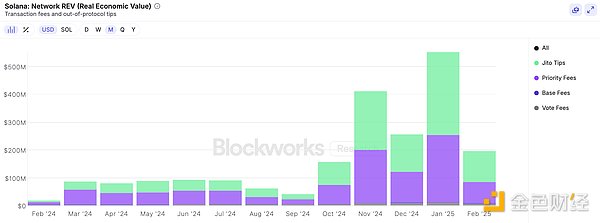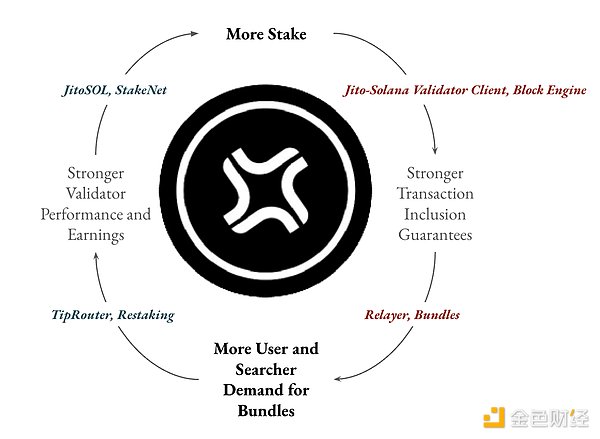Multicoin: We are optimistic about JTO, which has 4-5 times the increase

Reprinted from jinse
03/05/2025·3MAuthor: Shayon Sengupta, investment partner at Multicoin Capital; Tushar Jain, co-founder of Multicoin Capital; Translated by: 0xjs@Golden Finance
On March 4, 2025, Multicoin Capital released a 45-page JITO asset valuation report. Multicoin Capital said it has accumulated considerable holdings in Jito Network native token JTO in the past three years through its hedge funds and venture capital funds.
Multicoin Capital’s optimistic valuation of JTO is $11.63, 4.45 times the 7-day weighted average price (TWAP) as of March 3, 2025. After the Multicoin Capital Jito report was released, JTO prices quickly rose from $2 to $2.4, an increase of nearly 20%.
The following is a summary of the Multicoin Capital JTO valuation report. For the complete report and analysis content, see "https://assets.ctfassets.net/qtbqvna1l0yq/1y16WQhzMYGZSWGOC7CQIP/e431ba50cabfedf41520c2252d6924ee/JTO_Asset_Report.pdf\", which includes the valuation model and target price of Multicoin Capital.
Report summary
Jito has become an integral part of the Solana economic system, and we believe its system is the critical infrastructure for processing transactions and generating blocks on the Solnan network. Our confidence in Jito (and its native token JTO) is deeply rooted in the structural locking mechanism established by Jito between stakers, validators, front-ends and users, and its dominance in the transaction supply chain. In short, it is at the heart of a multilateral network that keeps Solana running efficiently.
Today, Jito is an integrated software system consisting of three core components:
Transaction processing and block generation architecture, namely Jito-Solana validator client, as well as related product repeaters (Relayer), shard streams (Shredstream), block engines (Block Engines) and transaction packaging (Bundles);
Staking architecture (i.e. JitoSOL, Jito's liquid staking tokens, and Stakenet, Jito's autonomous and decentralized staking delegation algorithm);
Re-staking architecture, that is, node consensus network, including tip routers (TipRouter) and vaults (Vaults).
We have conducted valuation analysis and discussion on asset ledgers on the framework of Maximum Extractable Value (MEV). Throughout 2024, MEV acquisition and redistribution continue to develop upward in the technology stack. We expect this trend to continue for the foreseeable future. As the cryptocurrency market structure matures, we believe that JTO will be one of the biggest beneficiaries of this trend.
Solana is currently the most widely used and most productive public chain network. Starting from Q4 2024, it has been far surpassing all other major blockchain networks in terms of transaction revenue (data from Dune Analytics, charts do not include tips) and transaction volume (data from DefiLlama). Since then, Solana's real economic value (REV) has increased significantly with the growth of billions of transaction volumes, and more than half of the transaction fees on Solana are processed through the Jito system.

Source: Blockworks Research, March 3, 2025
In addition to the trend of value acquisition toward the upward development of the technology stack, we believe that JTO is the best way to obtain asymmetric exposure to the Internet capital market on Solana after being fundamentally reasonable and risk-adjusted.
For the normal operation of a license-free, high-performance distributed asset ledger, transaction execution is crucial around fierce competition. Solana's initial vision of "Nasdaq speed-like blockchain" was to process large amounts of information input and output with low latency. Jito plays a key role in this regard, classifying Solana’s transactions based on time preferences while stabilizing the network and preventing network congestion due to excessive demand for transaction inclusion.
With the expansion of Solana system, Jito's range of products have played an important role in maintaining the user experience. At the time of writing, more than 94% of stakes on Solana run the Jito-Solana client, which provides much-needed reliability for transaction confirmation at a sustained low median fee during market high volatility events. We believe that this brings exponential growth possibilities to the application layer—supporting application scenarios such as high-performance derivatives exchanges (which can prioritize market maker withdrawals, thereby achieving narrower spreads such as Drift), decentralized physical infrastructure networks (DePINs such as io.net, Render, Hivemapper, GEODNET and Helium), and new spot asset issuance and trading platforms such as Jupiter, Clearpools and Backpack.
Every Jito product promotes each other. The StakeNet staking delegate system and JitoSOL staking pool encourage validators to run Jito-Solana clients. Running the Jito-Solana client allows validators to earn higher returns and allocate them to stakers by building more profitable blocks. Re-staking helps decentralize income distribution, while adding unique benefits to JitoSOL and JTO, further motivating users to use, and bringing additional benefits to stakers.

As the core of MEV acquisition and distribution on Solana, we expect Jito to occupy an increasingly large share of the economic value generated by Solana – transaction packaging tips, pledge rewards and re-staking income provide multiple ways to accumulate value. Based on the assumptions and models discussed in the Valuation Section of this report, our optimistic target price for JTO is USD 11.63, which is 4.45 times the 7-day time-weighted average price (TWAP) as of March 3, 2025.
Jito is a major beneficiary of Solana's explosive growth, with its token code JTO.



 panewslab
panewslab